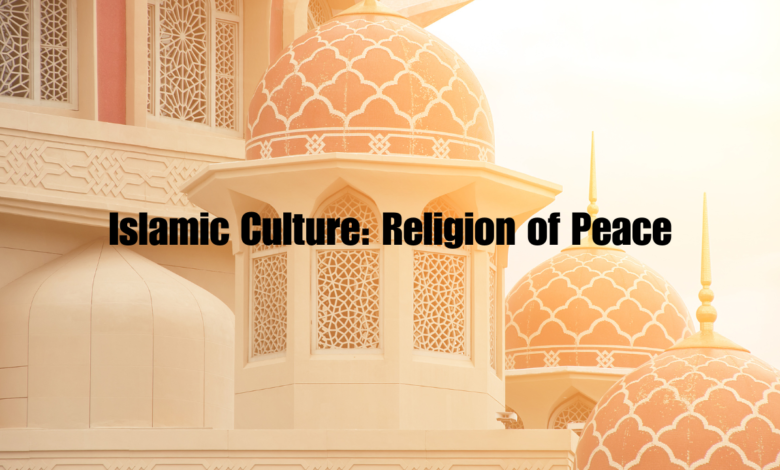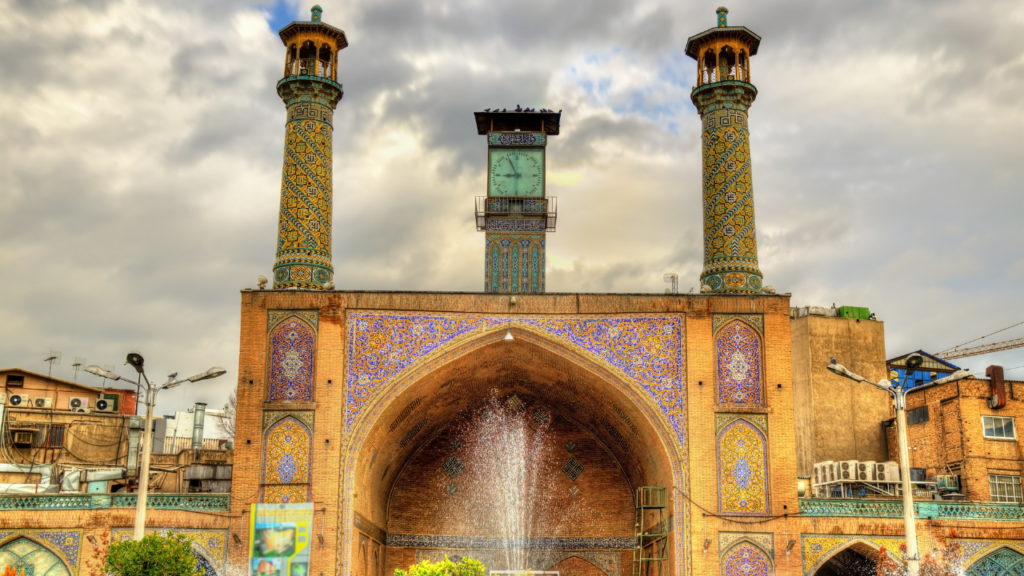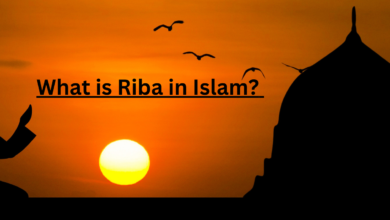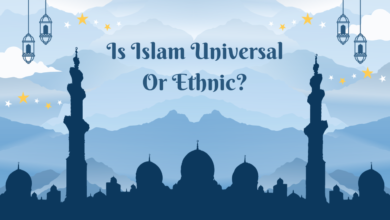Islamic Culture: Religion of Peace
Unraveling the Essence of Islamic Culture: A Path to Peace and Harmony

Islamic Culture: Religion of Peace
Islamic culture refers to the way of life, beliefs, practices, and traditions of Muslims who follow the religion of Islam. It encompasses a wide range of aspects, including religious rituals, social norms, art, architecture, cuisine, and more.

Introduction-Islamic Culture: Religion of Peace
Islamic culture is a rich tapestry of traditions, beliefs, and practices that have evolved over centuries, profoundly impacting the lives of over 1.9 billion Muslims worldwide. At its core, Islam is often referred to as the “Religion of Peace,” a phrase that encapsulates the fundamental values and principles that guide the lives of its followers. In this article, we will explore the essence of Islamic culture and why it is often associated with peace.
The Pillars of Islamic Culture
Monotheism (Tawhid): The foundation of Islamic culture lies in the belief in the oneness of God (Allah). Muslims believe that there is no deity except Allah and that all of creation is subject to His will. This monotheistic belief forms the basis of a harmonious and unified worldview.
Prophet Muhammad (PBUH): Central to Islamic culture is the profound respect and love for the Prophet Muhammad (peace be upon him). His life and teachings serve as a model for Muslims to emulate, promoting peace, justice, and compassion.
The Quran: The Quran, the holy book of Islam, is considered the word of God as revealed to the Prophet Muhammad. Its verses emphasize the importance of peace, justice, and kindness towards fellow human beings.
Prayer (Salah): Muslims are required to pray five times a day, facing the Kaaba in Mecca. These prayers serve as a constant reminder of the importance of spirituality, reflection, and seeking peace through communion with God.
Charity (Zakat): The obligation to give to those in need is deeply ingrained in Islamic culture. Muslims are required to give a portion of their wealth to the less fortunate, promoting economic and social justice.
Fasting (Sawm): During the holy month of Ramadan, Muslims fast from dawn until sunset. This practice not only promotes self-discipline but also fosters empathy for those who are less fortunate, reinforcing the culture of compassion.
Pilgrimage (Hajj): The annual pilgrimage to Mecca is a profound spiritual journey that unites Muslims from around the world. It emphasizes equality, unity, and the pursuit of inner peace.
Also check.
- Why Suicide is Haram in Islam
- What is the major sins in Islam
- What are the most important things in Islam?
- When does Ramadan end?
- Why is it haram to abuse in Islam?
The Culture of Peace
Islamic culture promotes a culture of peace in several ways:
Justice: Islam places a strong emphasis on justice, both in personal conduct and societal interactions. The Quran states, “O you who have believed, be persistently standing firm for Allah, witnesses in justice.” (Quran 4:135) This commitment to justice is essential for the establishment of peace.
Compassion: Muslims are encouraged to show compassion and kindness to all living beings. The Prophet Muhammad (peace be upon him) said, “He who does not show mercy to others, Allah will not show mercy to him.” This emphasis on compassion is a cornerstone of peace.
Interfaith Relations: Islamic culture encourages dialogue and cooperation with people of other faiths. The Quran promotes peaceful coexistence and understanding among different religious communities, stating, “There shall be no compulsion in [acceptance of] the religion.” (Quran 2:256)
Conflict Resolution: Islam provides a framework for peaceful conflict resolution through negotiation, mediation, and reconciliation. It encourages forgiveness and the avoidance of violence whenever possible.
Community and Brotherhood: Islamic culture promotes a sense of community and brotherhood among Muslims. This unity fosters peace within the Muslim community and can extend to broader society.
Conclusion
Islamic culture, often referred to as the “Religion of Peace,” is a holistic way of life that seeks to promote harmony, justice, and compassion in the world. While misconceptions and misinterpretations have sometimes overshadowed these ideals, the core principles of Islam are undeniably rooted in peace. By understanding and appreciating the depth of Islamic culture, we can foster greater intercultural understanding and contribute to a more peaceful and harmonious world for all.
FAQs-Islamic Culture: Religion of Peace
What is Islamic culture?
Islamic culture refers to the way of life, beliefs, practices, and traditions of Muslims who follow the religion of Islam. It encompasses a wide range of aspects, including religious rituals, social norms, art, architecture, cuisine, and more.
Why is Islam often called the “Religion of Peace”?
Islam is often referred to as the “Religion of Peace” due to its core values and teachings that promote peace, justice, compassion, and harmony among individuals and communities. The word “Islam” itself is derived from the Arabic word “Salaam,” which means peace.
What are the Five Pillars of Islam, and how do they relate to Islamic culture?
The Five Pillars of Islam are the fundamental acts of worship and practice for Muslims. They include the declaration of faith (Shahada), prayer (Salah), charity (Zakat), fasting during Ramadan (Sawm), and pilgrimage to Mecca (Hajj). These pillars are integral to Islamic culture, shaping the way Muslims lead their lives.
How does Islamic culture promote interfaith relations?
Islamic culture encourages dialogue, understanding, and cooperation with people of other faiths. The Quran promotes peaceful coexistence and respect for religious diversity. Muslims are encouraged to engage in interfaith dialogue to foster understanding and build bridges between different communities.
What role does justice play in Islamic culture?
Justice is a central theme in Islamic culture. The Quran and Hadith (sayings and actions of Prophet Muhammad) emphasize the importance of fair and equitable treatment of all individuals, regardless of their background. Muslims are encouraged to seek justice and stand up against oppression.
How does Islamic culture address conflict resolution?
Islamic culture provides guidance on peaceful conflict resolution through negotiation, mediation, and reconciliation. Muslims are encouraged to avoid violence whenever possible and to seek peaceful solutions to disputes.
How does charity (Zakat) contribute to Islamic culture?
Zakat, or obligatory charity, is a key component of Islamic culture that promotes economic and social justice. Muslims are required to give a portion of their wealth to help those in need, which fosters a sense of compassion and solidarity within the community.
What are some common misconceptions about Islamic culture?
Common misconceptions about Islamic culture include associating it solely with terrorism, misunderstanding the role of women, and misinterpreting Islamic law (Sharia). It’s important to approach these topics with an open mind and seek accurate information.
How does Islamic culture encourage compassion and kindness?
Islamic culture promotes compassion and kindness through the teachings of Prophet Muhammad (peace be upon him). Muslims are encouraged to show mercy and empathy toward all living beings, and these qualities are highly regarded virtues in Islamic culture.
What is the significance of the Hajj pilgrimage in Islamic culture?
The Hajj pilgrimage to Mecca is one of the Five Pillars of Islam and holds great cultural and religious significance. It symbolizes unity, equality, and the pursuit of inner peace. Muslims from around the world come together to fulfill this sacred duty and strengthen their sense of community.




